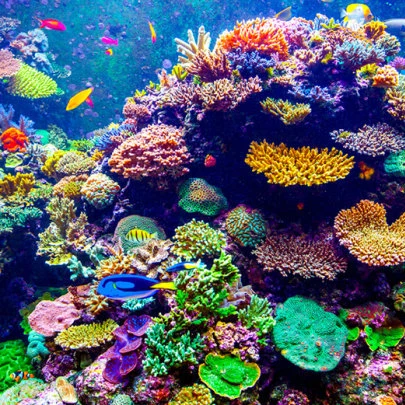Adverts
The Magic of Coral Reefs
The underwater world of coral reefs is a true spectacle of colors and shapes. These ecosystems, which look like real underwater gardens, are home to a multitude of species and play a crucial role in the health of the oceans.
Corals, with their calcareous structures, are the silent architects that build these complex and fascinating habitats.
Adverts
When we dive into this universe, we are immediately transported to a setting where colorful fish, dancing anemones and marine plants coexist in perfect harmony.
The coral reef environment is a living example of biological diversity. They are home to approximately 25% of all marine species, despite covering less than 1% of the ocean's surface.
Adverts
This impressive contrast reveals the density of life and the complexity of these ecosystems, where each being, no matter how small, plays an essential role in the natural balance.
In addition to being a paradise for divers and underwater photographers, coral reefs are also a source of inspiration for artists and writers, who find in their exuberant and mysterious beauty a rich material for their creations.
The Ecological Function of Coral Reefs
The importance of coral reefs goes far beyond their beauty. They are essential for maintaining the ecological balance of the oceans. Functioning as natural nurseries, these environments provide shelter and food for a wide range of marine species during their early stages of life.
This is vital for the continuity of populations of fish and other organisms that depend on these areas to reproduce and grow.

Coral reefs also act as natural barriers, protecting coastlines from erosion caused by waves and storms.
By absorbing wave energy, they reduce the impact that waves could have on coastal areas, thus preserving terrestrial ecosystems and human communities living near the sea.
- Water filtration: Corals and other organisms filter the water, removing impurities and contributing to the clarity and quality of the marine environment.
- Food source: Many fish and invertebrates depend on reefs for food.
- Coastal protection: The structure of the reefs dissipates the force of the waves, protecting the coasts from erosion and flooding.
- Medicine: Compounds extracted from corals are being studied for the development of new medicines.
Threats and Challenges
Despite their importance, coral reefs face several threats that put their existence at risk.
Global warming is one of the main threats, causing coral bleaching, a phenomenon in which corals lose their vibrant colors and turn white due to heat stress.
Ocean acidification, resulting from rising levels of carbon dioxide in the atmosphere, also compromises the ability of corals to build their calcareous structures.
In addition, destructive fishing practices, pollution and uncontrolled coastal development contribute to the degradation of these ecosystems. Blast and cyanide fishing, for example, cause irreparable damage to reefs, killing not only corals but also many other life forms that depend on them.
Conservation Measures
Protecting coral reefs requires a coordinated global effort. Several initiatives are being implemented to preserve these ecosystems, including the creation of marine protected areas, monitoring reef health and promoting sustainable fishing practices.
Additionally, coral restoration projects, where coral fragments are grown in nurseries and then transplanted back to the reef, have shown promising results.
Education and awareness also play a crucial role. Informing the public about the importance of coral reefs and the threats they face is essential to mobilizing support and promoting behavioral change.
Every individual can contribute to the conservation of coral reefs, whether by reducing their environmental impact, supporting conservation organizations, or simply appreciating and respecting the beauty and fragility of these wonderful ecosystems. 🌊
Conclusion
Coral reefs are true treasures of nature, essential for the health of the oceans and marine biodiversity. However, they not only delight with their scenic beauty, but also perform crucial ecological functions, such as coastal protection, water filtration and providing habitat and food for countless species.
However, these ecosystems are under threat due to global warming, ocean acidification, and destructive fishing practices and pollution.
It is therefore imperative that we take immediate and effective action to protect and restore coral reefs. Global initiatives such as the creation of marine protected areas and coral restoration projects show promise in conserving these habitats.
Furthermore, education and public awareness are vital to mobilizing efforts to protect coral reefs. We can all contribute, whether through sustainable practices in our daily lives, supporting conservation organizations, or simply by respecting and appreciating the fragility of these ecosystems.
In short, preserving coral reefs is a collective responsibility. These magnificent ecosystems are the basis of marine life and are essential for the balance of the oceans.
Protecting coral reefs is protecting our own future, ensuring that future generations can also enjoy and benefit from the richness and diversity they offer. 🌊




